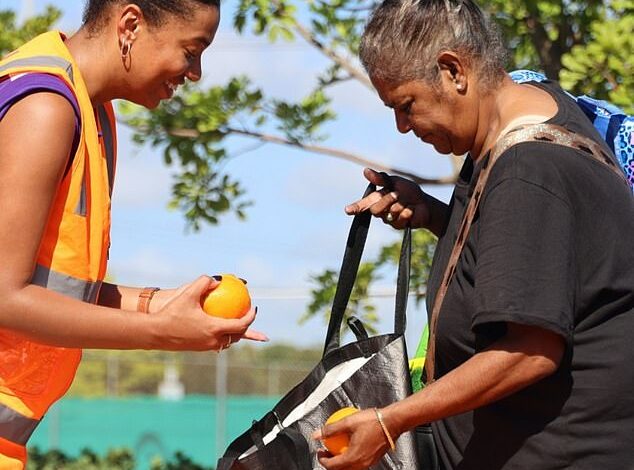Reserve Bank boss Michele Bullock issues chilling warning as more poor Australians turn to food banks and charities to survive in Albo’s Australia

- Reserve Bank chief reveals more Australians rely on charity
The country’s most powerful banker has revealed that more Australians are turning to charity for the first time in their lives to help them survive.
Reserve Bank Governor Michele Bullock told a luncheon for a mental health charity that the big interest rate hikes are prompting more people to seek help they might not have sought before.
“Information we have received through the RBA’s liaison program indicates that more people than usual are seeking support from community organisations, often for the first time,” she told the Australian Business Economists lunch in Sydney on Thursday.
She noted that low-income households and renters are the most vulnerable.
“Lower-income households tend to spend more money on basic necessities, such as food, utilities and rent,” she said.
‘The experiences of individual households vary widely, but younger and lower-income households are particularly affected by the pressure on the cost of living.’
However, in her speech ‘The High Cost of Inflation’ for the charity Anika Foundation, Ms Bullock ruled out cutting interest rates before Christmas.
“Of course, circumstances can change and if economic conditions do not evolve as expected, the board will respond,” she said.

The country’s most powerful banker has revealed that more Australians are turning to charity to survive (pictured is a Foodbank charity worker)
‘But if the economy develops overall as expected, the government does not expect to be able to cut rates in the short term.
“We need to see the consequences in inflation before we can do that.”
The RBA cash rate was left unchanged last month at a 12-year high of 4.35 per cent. Relief is unlikely to come soon from 13 rate hikes in 2022 and 2023.
The most aggressive rate hikes since the late 1980s have already hit the economy, with growth of 1 percent in the year through June the weakest since the 1991 recession, barring a pandemic.
But Ms Bullock said that if we don’t tackle high inflation now, it will only lead to even higher unemployment later.
“High and volatile inflation can also cause shifts in people’s wealth and purchasing power,” she said.
‘It’s harder to sign a new contract or make savings plans if you don’t know how expensive things will be in the future.
‘Moreover, high inflation eventually requires disinflation, which can impose long-term costs on households in the form of higher unemployment.’
Inflation was 3.8 percent in June and the Reserve Bank does not expect the annual consumer price index to fall below its target of 2 to 3 percent before the end of 2025.
Unemployment rose to 4.2 per cent in July, the highest level in two years. The RBA predicts unemployment will rise to 4.4 per cent by the middle of next year.

Reserve Bank Governor Michele Bullock told a luncheon for a mental health charity that aggressive interest rate hikes were now forcing more people to seek help they previously would not have sought.




